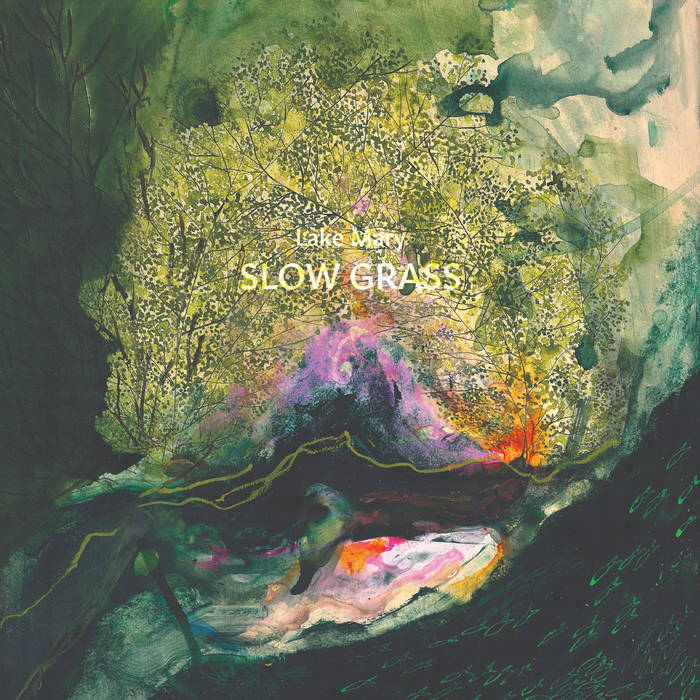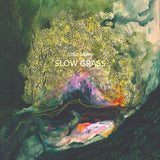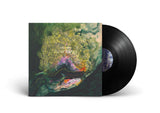Lake Mary // Slow Grass LP
- Availability:
当店でおなじみのアンビエント・フォークバンドFuubutsushiのギター担当しても活動しているアメリカ・ミズーリ州のアンビエント作家Lake Maryが、2022年12月に同国アンビエントレーベルWhited Sepulchre Recordsから300部限定でリリースしたレコードです。
牧歌的なアンビエント・フォーク〜アメリカンプリミティブ2曲を収録。
Fuubutsushiメンバーも参加しています。DLコード付属。
Chaz Prymek - guitars
Patrick Shiroishi - Saxaphones, Clarinets, Vocals, Percussion
Chris Jusell - Violins
Paul DeHaven - Synths
Whited Sepulchre Recordsその他作品はこちら /// Click here to see more Whited Sepulchre Records releases available at Tobira.
---------------------------------
Includes DL code. Edition of 300.
Whited Sepulchre Records:
"Chaz Prymek’s oeuvre is staggering. At the age of 35, the Missouri-based guitarist / multi-instrumentalist, composer and improvisor has released nearly two dozen recordings under the name Lake Mary, either solo or in collaboration. And over the course of 2020 and 2021, as part of the Fuubutsushi quartet, he released an acclaimed suite of four seasonal ambient jazz records. There is a spectrum of styles, influences, and effects in the Lake Mary catalogue, but all of it can be characterized by patience and a kind of measured beauty. Often longform, the music of Lake Mary moves within the rather open bounds of what might be called organic ambient or extended studies of American Primitive music.
And so it is the case with the utterly graceful Slow Grass. Comprised of one long piece of music totaling 40 minutes, separated into a few movements and split over two sides, this latest offering under the Lake Mary banner prominently features Prymek’s often fingerpicked acoustic guitar. His playing is spare but not without energy, and it moves through billows of violin, saxophone, nearly-transparent synthesizers, field recordings and the sirenic singing of Patrick Shiroishi, who is best known as one of the busiest and most versatile saxophone players in the contemporary American avant garde. (Indeed he also contributes saxophone here.) Somehow both modest and masterful, Shiroishi’s evocative singing calls out from and interweaves with a medium distance, not unlike Richard Youngs on his gentle epic, Sapphie or Sarah Davachi on “Play the Ghost.” Prymek meanwhile occasionally switches to playing with a slide or hammering his guitar like a dulcimer, experimenting, gently and masterfully, not only with the timbre of the guitar, but its narrative effect. The results are pastoral and achingly beautiful.
Fans of Bonnie “Prince” Billy and Mick Turner’s Get On Jolly or Kath Bloom’s work with Loren Connors will find much to love in this music. But Slow Grass is not merely a reflection of records that have come before it. Everything that happens on Slow Grass feels informed by relationships and vivid presence –– presence of mind, presence of memories, sonic presence. The fact that Prymek plays so often and so generously with so many different players is itself a framework for hearing the music. This music is nothing if not generous, open, and warm. It is music that proceeds from and returns to tenderness. In fact, it is an elegy. Prymek wrote Slow Grass while his beloved dog Favorite’s health was declining throughout 2019 and 2020, and the work is named for the moments toward the very end of Favorite’s life when she became immobile, and Prymek and she would simply lay and watch the grass grow. “Life is full of pain,” says the late John Berger. “Tenderness is in part a response to that. But it is also something else. In the face of what is so often surrounding us, tenderness is an almost defiant act of freedom.” Slow Grass is like this. It is tender to the extent that it feels defiant, like shelter is defiant. Prymek says that his playing on the second movement is “an older style of playing,” similar to how he played guitar at that time, 14 years ago, when he first got Favorite. “It's important,” he says, “to remember your origin stories.” This is perhaps the key to Slow Grass. Though we cannot undo the pain of loss, we can defy it by sheltering what and how we have loved. Slow Grass may be born of heartache, but it is not mourning music. To treat memories –– even painful ones –– with tenderness; to treat collaborators with tenderness; to treat instruments with tenderness is to defy callousness. Slow Grass does all of this to a staggering effect. "
Artist : Lake Mary
Label : Whited Sepulchre Records
当店でおなじみのアンビエント・フォークバンドFuubutsushiのギター担当しても活動しているアメリカ・ミズーリ州のアンビエント作家Lake Maryが、2022年12月に同国アンビエントレーベルWhited Sepulchre Recordsから300部限定でリリースしたレコードです。
牧歌的なアンビエント・フォーク〜アメリカンプリミティブ2曲を収録。
Fuubutsushiメンバーも参加しています。DLコード付属。
Chaz Prymek - guitars
Patrick Shiroishi - Saxaphones, Clarinets, Vocals, Percussion
Chris Jusell - Violins
Paul DeHaven - Synths
Whited Sepulchre Recordsその他作品はこちら /// Click here to see more Whited Sepulchre Records releases available at Tobira.
---------------------------------
Includes DL code. Edition of 300.
Whited Sepulchre Records:
"Chaz Prymek’s oeuvre is staggering. At the age of 35, the Missouri-based guitarist / multi-instrumentalist, composer and improvisor has released nearly two dozen recordings under the name Lake Mary, either solo or in collaboration. And over the course of 2020 and 2021, as part of the Fuubutsushi quartet, he released an acclaimed suite of four seasonal ambient jazz records. There is a spectrum of styles, influences, and effects in the Lake Mary catalogue, but all of it can be characterized by patience and a kind of measured beauty. Often longform, the music of Lake Mary moves within the rather open bounds of what might be called organic ambient or extended studies of American Primitive music.
And so it is the case with the utterly graceful Slow Grass. Comprised of one long piece of music totaling 40 minutes, separated into a few movements and split over two sides, this latest offering under the Lake Mary banner prominently features Prymek’s often fingerpicked acoustic guitar. His playing is spare but not without energy, and it moves through billows of violin, saxophone, nearly-transparent synthesizers, field recordings and the sirenic singing of Patrick Shiroishi, who is best known as one of the busiest and most versatile saxophone players in the contemporary American avant garde. (Indeed he also contributes saxophone here.) Somehow both modest and masterful, Shiroishi’s evocative singing calls out from and interweaves with a medium distance, not unlike Richard Youngs on his gentle epic, Sapphie or Sarah Davachi on “Play the Ghost.” Prymek meanwhile occasionally switches to playing with a slide or hammering his guitar like a dulcimer, experimenting, gently and masterfully, not only with the timbre of the guitar, but its narrative effect. The results are pastoral and achingly beautiful.
Fans of Bonnie “Prince” Billy and Mick Turner’s Get On Jolly or Kath Bloom’s work with Loren Connors will find much to love in this music. But Slow Grass is not merely a reflection of records that have come before it. Everything that happens on Slow Grass feels informed by relationships and vivid presence –– presence of mind, presence of memories, sonic presence. The fact that Prymek plays so often and so generously with so many different players is itself a framework for hearing the music. This music is nothing if not generous, open, and warm. It is music that proceeds from and returns to tenderness. In fact, it is an elegy. Prymek wrote Slow Grass while his beloved dog Favorite’s health was declining throughout 2019 and 2020, and the work is named for the moments toward the very end of Favorite’s life when she became immobile, and Prymek and she would simply lay and watch the grass grow. “Life is full of pain,” says the late John Berger. “Tenderness is in part a response to that. But it is also something else. In the face of what is so often surrounding us, tenderness is an almost defiant act of freedom.” Slow Grass is like this. It is tender to the extent that it feels defiant, like shelter is defiant. Prymek says that his playing on the second movement is “an older style of playing,” similar to how he played guitar at that time, 14 years ago, when he first got Favorite. “It's important,” he says, “to remember your origin stories.” This is perhaps the key to Slow Grass. Though we cannot undo the pain of loss, we can defy it by sheltering what and how we have loved. Slow Grass may be born of heartache, but it is not mourning music. To treat memories –– even painful ones –– with tenderness; to treat collaborators with tenderness; to treat instruments with tenderness is to defy callousness. Slow Grass does all of this to a staggering effect. "
Artist : Lake Mary
Label : Whited Sepulchre Records







